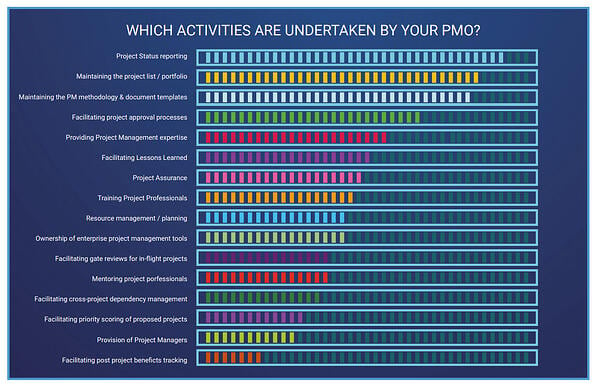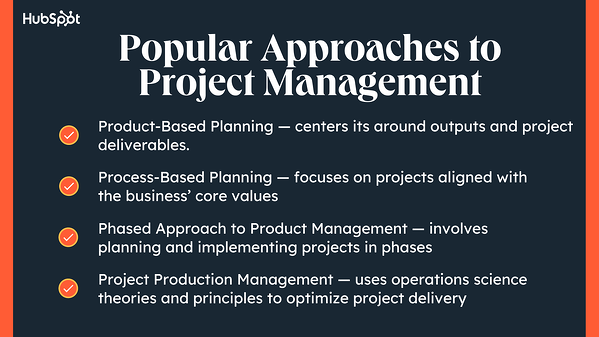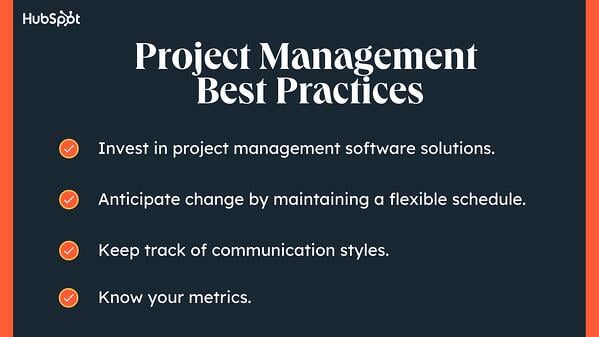Project management isn’t just about building software and hardware. Project managers distribute resources appropriately, manage timelines, and take care of stakeholders throughout the process.

However, that’s often easier said than done. After all, there’s a reason project managers are constantly tweaking their approaches and rethinking their processes.
In this article, you’ll learn project management basics and how you can implement them in your business. Let’s get started.
Table of Contents
What is project management?
Project management is a specialized form of managerial accounting. It involves planning, organizing, implementing, controlling, and monitoring the efforts of one or more groups to complete a specific project.
The process includes developing plans for meeting deadlines while maintaining quality objectives within time and budget constraints. This discipline can be owned by a dedicated manager or a leader on a project.
Why is project management important?
Project management processes are essential to successful projects. Research from the Project Management Institute found that organizations that don’t integrate project management will see their outright project failure rate increase by a factor of 2/3.
That’s a shocking statistic. So, let’s dig deeper into some key benefits that result from mature project management processes.
You’ll meet important deadlines.
Project management allows you to break large tasks into smaller-scale deadlines. By sticking to these milestones, projects can easily stay on schedule from beginning to end.
In fact, companies with mature value-delivery processes deliver projects on time more frequently than those without project management (63% compared to 39%).
You’ll increase buy-in.
Project management enables a team to build trust and credibility among peers, customers, and stakeholders. After all, if you’re consistently submitting high-quality deliverables on time, then you’re bound to win people over.
You can easily track spend.
You’ll be able to stay within your budget, or even under budget. PMI found that 11.4% of all resources are wasted due to inferior project management processes.
Saving money is especially important in a landscape where only 43% of companies report that they complete projects on budget “most of the time” or “always.”
You’ll improve your culture.
You can develop a culture of continuous process improvement through knowledge management. If you foster an environment that prioritizes optimization and learning, you’ll likely inspire others and attract employees with the same mentality.
What is a project manager?
Project managers handle project planning and execution. They are responsible for defining the success criteria, determining the requirements, estimating costs, and monitoring activities, deliverables, and personnel performance.
Project Manager Responsibilities
A project manager plans, organizes, and leads the execution of a project. This ensures that it meets the expected goals while delivering the required features within time and budget constraints.
Project management professionals provide leadership through effective environmental scanning, synthesis of information into meaningful data, and objective analysis. That’s a broad set of responsibilities that require training and experience.

We’ll discuss what skills — both trained and developed through experience — you’ll need for this role.
Project Manager Skill Sets
To ensure the teams stay productive and that projects are on track, project managers need a broad set of skills. Here are some of the most important skills that you need to excel in this role.

Interpersonal Skills
Project managers (PMs) have to interact with many people, including team members, stakeholders, and other project managers. Great PMs can work with a diverse group of people to achieve a common goal.
Stakeholders often have competing objectives. To create cohesion, PMs must be diplomatic as they manage professional relationships with people who may have different perspectives, skill levels, and personal politics.
Good relationships keep team members motivated and make solving team disputes easier.
Communication Skills
Project managers must schedule frequent meetings between collaborators and provide feedback on performance. Not only do you need to know who to meet with and when, you’ll also need to balance multiple communication styles.
For example, legal will want your update in terms of contracts and risk. Meanwhile, finance will be eager to hear about your budget and spend. Engineers and the marketing team will also have different interests that require different types of communication.
Decision-Making Skills
A project manager must make decisions and take responsibility for results. Being clear about objectives and setting high expectations helps maintain morale.
Decision-making skills include prioritizing resources, developing alternative estimates, assessing risks, and ensuring proper budget management.
Management Skills
Project managers are responsible for both leading a team and reporting progress to more senior plays.
You’ll need experience leading a team, holding one-on-ones, and addressing challenges as they arise. PMs should also be able to communicate with leadership on behalf of their teams.
In some cases, project managers need to build the team for their initiative. That may include finding the right internal participants or looking outside the organization. Ideally, a PM has some experience recruiting new team members.
The Project Management Life Cycle
It’s best to look at the entire PM process as a series of stages. Each stage has an objective. In total, there are five critical stages in the project management life cycle. We’ll offer a brief overview of each stage.
- Initiation. In this stage, project managers take a look at a project realistically. They estimate how long the project should take, which eventually determines the baseline budget and timeline for the project.
- Planning. The planning stage involves analyzing technical details, assigning tasks to the right team members, and identifying risks associated with different parts of the project.
- Execution. Here you start acting on the plan you created in the previous state.
- Monitoring and control. This step ensures you meet your deadlines. Not only are you doing the work laid out in your plan, you’re also monitoring your progress. Here, you determine whether you comply with all governmental regulations and industry standards. You also track all of the project expenditures and progress.
- Closing. Bringing a project to a close is its final stage. Here, you determine whether the project delivers its intended results and whether to cancel or continue the project.
Popular Approaches to Project Management

While most organizations agree that project management is important, there are many different styles PMs use. In this section, you’ll explore four popular approaches to project management.
Product-Based Planning
Product-based planning centers its approach around outputs and project deliverables. This approach focuses on launching a product or service from conception through completion, with the end-result being sales of the product or service.
Process-Based Planning
Process-based planning ensures all project activities contribute to achieving organizational objectives. With this approach, the project manager creates, manages, and improves projects aligned with the business’ core values.
Phased Approach to Product Management
This approach involves planning and implementing projects in phases due to external constraints. Each stage goes through the five steps in the product management life cycle. Because of that, this approach is ideal for small and well-defined projects.
Project Production Management
This approach uses operations science theories and principles to understand and optimize project delivery. Project production management uses activity data to predict limits and determine achievement levels.
Project Management Best Practices
Regardless of which approach you choose, there are universal tips that help everyone. Here are some of those best practices applicable to any project in any industry or domain.
[embedded content]
1. Invest in project management software solutions.
Today, under 1 in 4 organizations use any kind of project management software. Instead, teams rely on a patchwork of spreadsheets, paper notes, and emails. This approach results in disorganization. There’s no way to see where a project is in real time.
Project management software will help you keep track of your projects and agendas, organize tasks and activities, communicate effectively with your team, and manage risks and issues.
You can also customize dashboards to track KPIs and create reports to help forecast based on historical data and current trends for future planning.
2. Anticipate change by maintaining a flexible schedule.
Most projects run into delays. Unfortunately, minor delays can snowball into significant problems when you follow a fixed schedule. On the other hand, a flexible schedule can handle most changes in stride.
While some deadlines have flexibility, others may be rigid. Keep a list of dates that cannot change. This allows you to meet external deadlines with set timeframes while allowing for flexible deadlines in other areas.
3. Keep track of communication styles.
At the start of your project, sit down with important stakeholders. Ask how frequently they want to hear from you and how they would like to communicate.
For example, some stakeholders will want a weekly Zoom meeting with your team. Others may prefer a daily Slack update or monthly email with progress.
You can organize this information into a spreadsheet or a section of your project management software to keep organized.
4. Know your metrics.
One of the biggest challenges with any project is measuring success. Because of this, you’ll need to set measurable points before and during the execution of your project. Know which metrics matter to your project and when.
Rember essential metrics will change over time. If your project is just starting out, you may just celebrate quickly reaching important milestones.
Over time, you’ll need to prove your project impact. That includes metrics like the number of leads or contribution to ROI.

Level Up Your Project Management
Taking a closer look at the basics, you can see project management is a broad field that requires a deep understanding of communication and industry-specific nuances.
By incorporating the tools and techniques mentioned above into your daily work experience, you can enhance your performance as a project manager.
To help you get the ball rolling, check out our free project management template now — it’ll help you save a lot of valuable time and resources.
- SEO Powered Content & PR Distribution. Get Amplified Today.
- Platoblockchain. Web3 Metaverse Intelligence. Knowledge Amplified. Access Here.
- Source: https://blog.hubspot.com/marketing/project-management-basics

